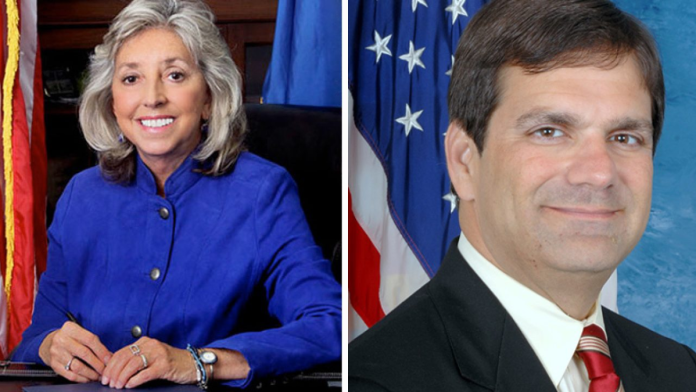A new bipartisan bill has been introduced in the U.S. Congress to hold Azerbaijani leaders accountable for serious human rights abuses. The legislation, called the Azerbaijan Sanctions Review Act of 2025, was brought forward by Representatives Dina Titus (D-NV) and Gus Bilirakis (R-FL). It directs the U.S. government to review whether sanctions should be placed on more than 50 Azerbaijani officials. These include top military officers, prosecutors, judges, and other leaders accused of overseeing war crimes, ethnic cleansing, and the imprisonment of Armenian captives.
The measure comes after years of violence and displacement in the region. According to the findings of the bill, Azerbaijan has a long record of targeting Armenians through wars, blockades, and forced expulsions. Titus stressed that Azerbaijan’s blockade of the Lachin Corridor left 120,000 people without food, medicine, and basic needs. Bilirakis emphasized that even though a peace declaration was signed last month, the humanitarian crisis continues.
The legislation calls on the U.S. President to decide within 180 days if these Azerbaijani officials meet the criteria for sanctions under the Global Magnitsky Human Rights Accountability Act or Section 7031(c) of the State Department Appropriations Act. Sanctions could include freezing assets and banning travel to the United States.
U.S. launches sweeping sanctions on Iranian crypto network moving $100 million in oil funds
Why Sanctions Are Being Considered
Supporters of the bill point to a long list of abuses. They highlight Azerbaijan’s 2020 war against Armenians, a violent campaign in 2023 that forced the ethnic Armenian population of Artsakh from their homeland, and the ongoing detention of prisoners of war and civilians.
The bill details how food and supplies were blocked from reaching Artsakh for months, leaving families desperate. Children were unable to attend school, people lacked medicine, and Christian religious sites were destroyed.
In addition, at least 23 Armenian captives remain illegally imprisoned. Among them are former Artsakh State Minister Ruben Vardanyan, former Foreign Minister Davit Babayan, former Defense Ministers Levon Mnatsakanyan and Davit Manukyan, and former Artsakh Presidents Arkadi Ghukasyan, Bako Sahakyan, and Arayik Harutyunyan. Also detained is former National Assembly Speaker Davit Ishkhanyan. These detainees are being held on fabricated charges, denied fair trials, and prevented from speaking to independent lawyers. International law experts have described these actions as clear violations of human rights.
Lawmakers behind the bill argue that rewarding Azerbaijan with military aid or economic deals while such abuses continue sends the wrong message. They believe that sanctions are a necessary tool to impose real consequences on those responsible. By targeting individuals directly, the U.S. can show that violations of international law will not be ignored.
Strong Advocacy from Armenian Groups
The introduction of the bill has been welcomed by Armenian advocacy organizations in the United States. The Armenian National Committee of America (ANCA) has mobilized nationwide to secure bipartisan support for the measure. Lenna Hovanessian, ANCA Western Region Board Member, praised Representative Titus for her leadership and described the bill as a beacon of hope for Armenian Americans.
Sanctions without teeth: Canada targets Russia, Iran, and North Korea but enforcement collapses
Legal and human rights experts have also strongly supported the initiative. Ken Hachikian, Chair of the Armenian Legal Center for Justice and Human Rights (ALC), and ALC Executive Director Siranush Sahakyan both joined Capitol Hill meetings to present the legal and humanitarian case for sanctions. They were joined by international lawyers Karnig Kerkonian and Jared Genser, who is also representing detained State Minister Ruben Vardanyan.
During a series of events in Washington organized by the ANCA, advocates highlighted the need for accountability. At a commemoration event marking two years since the ethnic cleansing of Artsakh, Congressional leaders such as Frank Pallone (D-NJ), Brad Sherman (D-CA), Judy Chu (D-CA), Vince Fong (R-CA), Laura Friedman (D-CA), and Raja Krishnamoorthi (D-IL) spoke about the importance of securing the release of Armenian prisoners and protecting Armenia’s sovereignty.
Another event, titled Justice for Armenian Prisoners, was moderated by Ken Hachikian and featured expert testimonies from Sahakyan, Kerkonian, and Genser. The session shed light on Azerbaijan’s ongoing use of hostage diplomacy and the urgent need for U.S. action.
For Armenian Americans and their allies, the introduction of this bipartisan legislation is a powerful moment. It shows that their voices are being heard in Washington and that the crimes committed against Armenians in Artsakh are not being forgotten.
